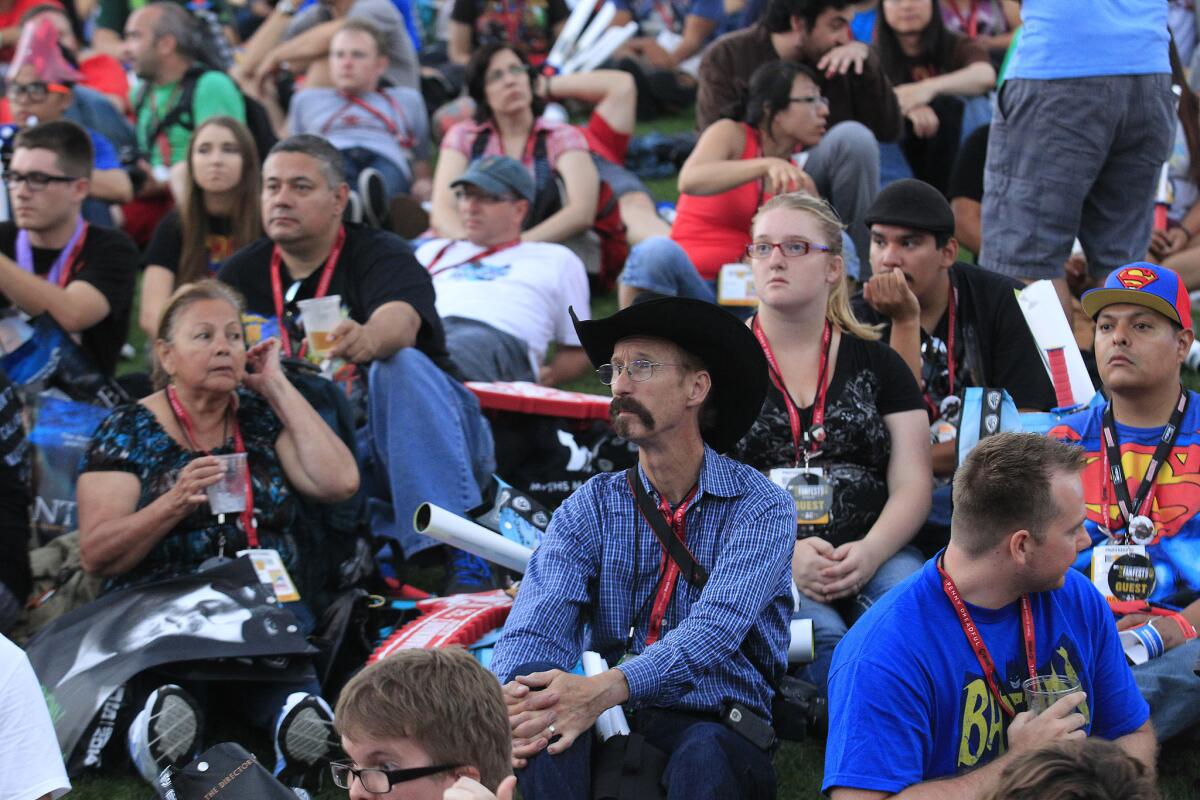Comic-Con, Hollywood and the nature of modern fandom

- Share via
At the annual Comic-Con International expo, pop-culture fandom is elevated to veritable religious status, and the convention’s 130,000-odd attendees have countless ways to worship at the altars of their choosing.
Want to dress up as a Stormtrooper? Suit yourself. Want to buy a bobblehead doll of your favorite movie character? Go for it. Want to stand in line for hours for the chance to be in the same room as the stars of your most cherished TV series? Right this way. Want to stand outside the San Diego Convention Center holding a sign that says “Kneel Before Zod”? Knock yourself out.
At this year’s Comic-Con, though, there was something new, a particular place where fans could gather to essentially pay tribute to themselves: the first-ever mtvU Fandom Awards, held at Petco Park for a crowd of roughly 4,500 convention-goers. There are other awards shows in which fans vote for the winners: The People’s Choice Awards, The Teen Choice Awards, The Kids’ Choice Awards, basically anything with the word “choice.” But the Fandom Awards were conceived as the first awards show in which the fans, not the stars, would actually be the winners.
“When you see all the enthusiasm fans have for their favorite TV shows and movies and the way they’re expressing it online through fan fiction, fan art and Tumblr — it just seemed like it would be great if we could come up with a franchise that would embrace that passion,” Ryan Kroft, MTV’s senior vice president of specials and events, explained.
Categories were designed to reflect the way fans engage with their favorite movies and shows, and celebrities on hand, including Channing Tatum, Chloe Grace Moretz and others, were instructed to keep their speeches focused squarely on the fans. “‘Game of Thrones’ fans are the best fans in the world!” actress Natalie Dormer announced when she collected the award for OMG Moment of the Year for the HBO series’ “Purple Wedding” episode. “‘Veronica Mars’ fans are the best!” actress Tina Majorino enthused on accepting the Fandom of the Year award for the legions of “Mars” fans who helped bring the erstwhile TV series back to life on the big screen through a Kickstarter campaign.
You can call it pandering (or “fan-dering”) if you like. But in many ways the Fandom Awards — and the entire circus of salesmanship Comic-Con has become over the years — represent the logical evolution of film and television creators’ increasingly sophisticated, and increasingly urgent, efforts to capture audiences’ enthusiasm.
In this digital age, fans are easier to reach than ever — and yet more fragmented and fickle than ever. With all of us awash in a vast and ever-expanding sea of entertainment options, most available at the click of a button or the swipe of a finger, it’s little wonder Hollywood is looking for new and innovative ways to court, or supplicate itself to, every potential ticket buyer or binge-watcher it can.
Fans, of course, are more than happy to be treated like royalty. As the late film critic Roger Ebert noted in his 2009 review of the movie “Fanboys,” there is an undeniable solipsistic and self-celebratory quality to much of fandom, a sense of being part of an elect tribe defined by taste.
“A lot of fans are basically fans of fandom itself,” Ebert wrote. “It’s all about them. They have mastered the ‘Star Wars’ or ‘Star Trek’ universes or whatever, but their objects of veneration are useful mainly as a backdrop to their own devotion. Anyone who would camp out in a tent on the sidewalk for weeks in order to be first in line for a movie is more into camping on the sidewalk than movies.”
On the face of it, Hollywood’s exaltation of fandom seems like a positive thing, a democratizing force that puts pop culture’s creators and its consumers on a level playing field. But it has its ugly side as well. There can be a thin line between obsession and aggression, and, under the Internet’s veil of anonymity, particularly rabid fans can sometimes turn into petulant, pedantic bullies.
Consider the tsunami of Twitter hate actor Ben Affleck received on being named as the new Batman in Zack Snyder’s upcoming “Batman v. Superman: Dawn of Justice” (which, perhaps not surprisingly, turned into uproarious cheers when Affleck took the stage at Comic-Con). Or, more troublingly, read through some of the vicious and often blatantly sexist comments Village Voice critic Stephanie Zacharek received from some diehard comic-book fans for writing a negative review of the new superhero space opera “Guardians of the Galaxy.”
Despite all of its efforts, it’s unclear whether Hollywood will ever figure out how to harness fan enthusiasm —be it through social media, Comic-Con, or any other avenues — in a way that consistently translates into profits. “Veronica Mars” fans may have brought the long-canceled show to the big screen with their Kickstarter donations, but, despite all the talk of the revolutionary power of crowd-funding, the movie ultimately proved a box office dud, grossing just over $3 million.
As former Variety editor-in-chief Peter Bart wrote last week on Deadline.com, “One studio chief told me recently that all social marketing represents is a road map for spending less money while still failing to find an audience.”
Nevertheless, this much is certain: As long as there are people so devoted to their favorite films and TV series that they will make a pilgrimage to San Diego and stand in endless lines in 80-degree heat, the creators and stars of those movies and shows will be there to meet them with bells on. Or maybe even Stormtrooper costumes.
Follow @joshrottenberg for more movie stories
More to Read
Only good movies
Get the Indie Focus newsletter, Mark Olsen's weekly guide to the world of cinema.
You may occasionally receive promotional content from the Los Angeles Times.









